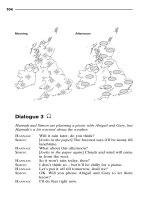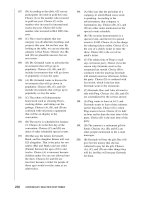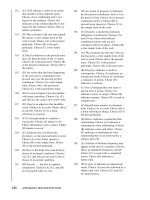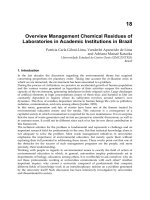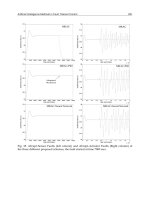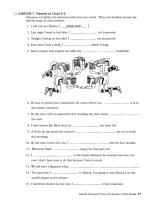New grammar practice part 13 pptx
Bạn đang xem bản rút gọn của tài liệu. Xem và tải ngay bản đầy đủ của tài liệu tại đây (49.58 KB, 10 trang )
Sentence structure
80 Frequency adverbs with the Present Simple
FORM
USE
• The adverb goes between the subject and the verb:
I often see them.
We rarely talk to them.
! seldom go out in the evenings.
• occasionally, sometimes, often, frequently, and normally can also be at the
beginning or end of a clause:
/ see them occasionally.
Sometimes we talk to each other.
Normally I go out in the evenings.
Note: always is sometimes used with present continuous to express annoyance, always
goes between the auxiliary verb and the main verb:
Sams's always borrowing my tilings without asking!
Peter's always complaining about his job!
Practice
Do this exercise in your notebook. Choose the correct word and write it in its
proper place in these sentences.
1 I see them nowadays - the last time we met was ten years ago.
{never / often / always)
/ never see them nowadays - the last time we met was ten years ago.
2 You're lucky: we have ice cream, but we've got some today,
(hardly ever / normally / nearly always)
3 Peter's playing football instead of doing his homework,
(seldom / hardly ever / always)
4 We go out now - we can't afford it. (hardly ever / sometimes / frequently)
5 I don't finish work before eleven o'clock, so I see the children before
they go to bed. (always / never / usually)
6 I sit here when I come to the park - it's my favourite place,
(hardly ever / occasionally / always)
117
Sentence structure
7 She comes here nowadays - I don't think she likes me.
(seldom / frequently / nearly always)
8 We don't go there every week, but we see them quite,
(seldom / often / occasionally)
9 We see them, at least once a week, (frequently / occasionally / always)
10 1 watch horror movies - I don't like them, (frequently / nearly always /
hardly ever)
81 Link words: and, but, so, then, before, after, because
Practice
Write one of the above words in the correct place in these sentences. Use
each word for two sentences. Where two answers are possible, choose the more
likely one.
1 I got out of the car and walked into the house.
2 The weather was lovely we stayed in the garden.
3 we went to bed, I locked all the doors.
4 The little boy was wet and cold he wasn't hurt.
5 We turned off the lights and left the room.
6 I had a bath we played football.
7 I sat in the kitchen read a book.
8 She worked hard failed all her exams.
9 I do some exercises I go to work in the morning.
10 They took me to hospital the crash.
11 We had no money the banks were closed.
12 We paid our hotel bill and left.
13 I had to walk to work the car wouldn't start.
14 It was very cold we didn't go out.
118
Sentence structure
82 Link words: because, as, since
Practice
Link the two sentences to make one sentence, using the word given. Don't
change the order of the two original sentences. Use a comma if the link word
comes at the beginning of your sentence.
1 She was very tired. She went to bed. (as)
As she was very tired, she went to bed.
2 I can't use my car. It's broken down, (because)
/ can't use my car because it's broken down.
3 He hasn't done any work. I don't think he'll pass the exam, (since)
4 The bus crashed. The driver fell asleep, (because)
5 It was raining. We decided not to go out. (as)
6 The climate is changing. The earth is getting warmer, (because)
7 Monday is a public holiday. We're going to spend the weekend in the
mountains, (since)
8 Romeo committed suicide. He thought Juliet was dead, (because)
9 You haven't seen the cathedral yet. I'll take you there on Sunday, (as)
10 The concert was cancelled. The singer was ill. (because)
119
Sentence structure
83 both and, neither nor
• Maria comes from Colombia. Felipe also comes from Colombia.
Maria and Felipe both come from Colombia. Both Maria and Felipe come
from Colombia.
• The police couldn't catch him. The army couldn't catch him. Neither the
police nor the army could catch him.
Practice
Rewrite the two sentences as one sentence using both and or neither nor.
1 Greg likes surfing. Liz likes surfing.
Both Greg and Liz like surfing. Or: Greg and Liz both like surfing.
2 The house wasn't attractive. The garden wasn't attractive.
Neither the house nor the garden were attractive.
3 The food was terrible. The service was terrible too.
4 Angela played the piano. Lucy also played the piano.
5 Jessica wasn't at home. Chloe wasn't at home.
6 His family didn't know about his accident. His friends didn't know
about his accident.
7 Eagles hunt small animals. Wolves hunt small animals.
8 The film is very funny. The book is also very funny.
9 The beach isn't far away. The shops aren't far away.
10 Japan has a lot of earthquakes. California has a lot of earthquakes.
120
Sentence structure
QUESTIONS AND ANSWERS
84 Making questions
• Questions are formed for all tenses except present simple and past simple by
changing the position of the auxiliary verb {am, was, will, etc.) and the
subject (I, you, she, he, etc.):
You 're going —• Are you going?
He has gone -» Has he gone?
• Questions are formed for the present simple and past simple by using do,
does, or did:
They work here. Do they work here?
She lived here. Did she live here?
> Exercise 28 and 34 for present simple and past simple.
Practice
84a Make questions from these statements.
1 She likes travelling
Does she like travelling?
2 They're working.
Are they working?
3 He was playing tennis.
4 She went to school today.
5 They live here.
6 She's eating at the moment.
7 They drove to the station.
8 She's reading
9 He had breakfast early.
Sentence structure
10 They came today.
11 She drives to work.
12 He left this morning.
13 He was writing a letter.
14 They watched television.
15 She's at home.
16 They went home.
17 She likes horror films.
18 He's walking home.
19 They were eating ice cream.
20 They gave him the money.
84b In your notebook, make ten questions from the box below, and give
the answers.
Who
Why
When
Where
What
What time
How
How much
are you going?
did they leave?
is she talking to?
did they come here?
are you looking at?
did it cost?
Example: Why did they leave?
Because they wanted to catch the train.
122
85 Who asked you? Who did you ask?: question words as subject or object
Who drove the car?
Who did you see?
What happened?
What did you do?
• who and what are sometimes the subject.
who and what as subject + verb:
Alison asked you. Who asked you? Alison.
NOT Who did ask you!
• who and what are sometimes the object.
who and what as object + question form of verb:
You asked Steve. Who did you ask? Steve.
• Who stayed with you?
but Who did Jane stay with? (Preposition at the end.)
Practice
Write the questions.
1 Who you? Simon came to see me.
2 Who last night? Julie met Barbara.
3 What you reading? I like reading novels.
4 Who ? Joe made the cake.
5 Who ? Helen found the car keys.
6 What ? A cigarette started the fire.
7 What you ? I want some help.
8 Who you? Caroline told me.
9 Who with Paul? Sue stayed with Paul.
10 What you ? I said nothing.
11 Who ? David came with Mary.
12 What you ? I study medicine.
13 Who ? Linda lives with her parents.
14 Who ? Greg opened the door.
15 What ? Something terrible happened.
86 Short responses using so, neither, nor
• so + auxiliary verb + subject is used to say that something which is true
about one thing or person is also true about another thing or person:
'I can speak Spanish.'
So can I.' ( = T can speak Spanish too)
• The negative form is neither/nor + auxiliary verb + subject;
'Mike didn't win the prize/
Neither/Nor did Bill' {= And Bill didn't win it)
• If there is no auxiliary verb in the first sentence, do / does / did is used:
'Leo plays tennis.'
'So does Tom.'
'We went to the cinema last night.'
So did we.'
Practice
Write responses to these statements using So or Neither/Nor and the word
in brackets.
1 I've got a cold. (I)
So have I.
2 Peter doesn't eat meat. (Steve)
Neither/nor does Steve.
3 Sarah had a baby last year. (Jo)
4 We're going away for the New Year, (we)
5 I'd like to have a pet. (I)
6 Harry hasn't finished his essay. (Paul)
7 I won't be able to go to the meeting. (I)
8 Jenny could read when she was three. (Fiona)
9 I wasn't very interested in history when I was at school. (I)
10 You should do more exercise, (you)
Sentence structure
87 Short responses: / think so, I hope so
1 think I hope so are used to give a positive answer to a question, or to agree
with someone without repeating what the other person said:
7s it Tuesday today?'
'Yes. I think so.' (= I think it is Tuesday.)
7s it ready?'
'I hope so.' (= T hope it's ready)
The usual negative forms are I don't think so, and I hope not:
'Will there be many people at the meeting?'
I don't think so.'
7 think it's going to rain.'
I hope not.'
Practice
Underline the correct or most likely response.
1 'Is Auckland the capital of Australia?'
a 'I don't think so.' b 'I hope not.'
2 'I think this is going to be a fantastic party.'
a 'I hope not.' b 'I hope so.'
3 'Will I have to go into hospital?'
a 'No, I don't think so.' b 'No, I don't hope so.'
4 'Will the house be finished before next year?
a 'Yes, I think so.' b 'Yes, I hope not.'
5 'I think it's going to be sunny this weekend.'
a T think so, because I'm playing tennis on Sunday.'
b 'I hope so, because I'm playing tennis on Sunday.'
6 'Are there 31 days in July?'
a 'T hope so.' b 'I think so.'
7 'T think John's going to give a speech.
1
a 'I hope so. He's really boring.' b 'I hope not. He's really boring.'
8 'Do you think there will be any food at the party?
1
a 'I don't think so.' b 'I don't hope so.'
9 'I think we're going to be late.'
a 'Oh, dear. I think so.' b 'Oh, dear. I hope not.'
10 'Excuse me? Is there a bank near here?'
a 'I think so, but I'm not sure.' b '1 hope so, but I'm not sure.'
125
Sentence structure
RELATIVE CLAUSES
Relative clauses with who and that
• Look at this sentence:
The man gave me some money.
If we want to describe the man, we can use an adjective [old, thin, young, etc):
The old man gave me some money.
• However, sometimes the information we want to give is more complicated.
The old man met me at the airport. He gave me some money.
The two sentences can be combined, to show which old man gave me
the money:
The old man who met me at the airport gave me the money.
who met me at the airport is a clause (a mini-sentence in the larger
sentence). It is a called a relative clause because it relates to ( = connects
with) a noun in the larger sentence.
FORM
• Relative clauses are often indicated by who (for people) and that (for things
and sometimes for people). The relative clause is placed immediately after the
noun which it describes.
I was talking to a person who worked with my father.
That's the car that crashed into our house.
• who or that replaces the pronoun:
I was talking to a person who worked with my father.
This is the man who I met in Paris.
(NOT This is the man who / mot him in Paris)
Practice
88 Join each pair of sentences together to make one sentence, using who or
that. Write the second sentence as a relative clause.
1 This is the woman. She gave me my first job.
This is the woman who Qave me my first job.
2 He picked up the book. It was on the desk.
He picked up the book that was on the desk.
3 The meal was delicious. Ben cooked it.
The meal that Ben oooked was deiicious.
4 She's the woman. She telephoned the police.
126

